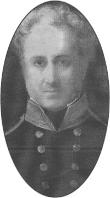Alexander Maconochie, a naval officer and penal reformer, was in command of the penal settlement on Norfolk Island between 1840 and 1844. His experimental system for prison management pioneered there was highly influential on subsequent developments in penal reform.
Born to the family of a legal and government agent, Maconochie was raised in the household of an aristocratic relative, Allan Maconochie, the third Lord Meadowbank. In 1803 he entered the Royal Navy and became a midshipman the following year. He saw active service during the Napoleonic Wars, and spent some years as a prisoner of war, before being paid off in 1815. After the wars he lived in Edinburgh, and in 1822 he married Mary Hutton-Browne, with whom he would had seven children. About 1828 he moved his family to London, where Maconochie was one of the founders of the Royal Geographical Society. In 1836, he took up the position of private secretary to Sir John Franklin, and travelled with him to Hobart when the latter took up the post of Lieutenant-Governor of Van Diemen's Land in 1837.
At the request of the English Society for the Improvement of Prison Discipline, Maconochie wrote a report on the Tasmanian convict system, which was published by the British government and tabled in parliament (as A Report on the State of Prison Discipline in Van Diemen's Land, 1838), where it was used by the Select Committee on Transportation headed by the radical MP William Molesworth. The report was highly critical of existing convict management, and the controversy arising in Hobart after its publication resulted in Maconochie's dismissal.
On the recommendation of the Molesworth Committee, Maconochie was appointed superintendent of the Norfolk Island convict settlement, arriving in March 1840. According to his biographer John V. Barry, while on Norfolk Island Maconochie "formulated and applied most of the principles on which modern penology is based." A strong believer that the aims of criminal punishment should be the reform of the convict, Maconochie generally rejected the cruel punishments that Norfolk Island had become known for, and introduced rational reforms, including his "Mark System" for the reward of good behaviour. Maconochie was recalled by the Colonial Office in 1844, ending his tenure at Norfolk Island in February that year.
Back in England, Maconochie promoted his reforms in a number of books and pamphlets, including the influential Crime and Punishment: The Mark System, Framed to Mix Persuasion with Punishment, and Make their Effect Improving, Yet their Operation Severe (1846). He had an ill-fated stint as governor of the New Prison, Birmingham before being dismissed in 1851. In 1855 he retired from the Navy with the rank of Captain, and despite ill health he continued to campaign for penal reform until his death in 1860.
 5765159084337400704.jpg
5765159084337400704.jpg
 5765159084337400704.jpg
5765159084337400704.jpg